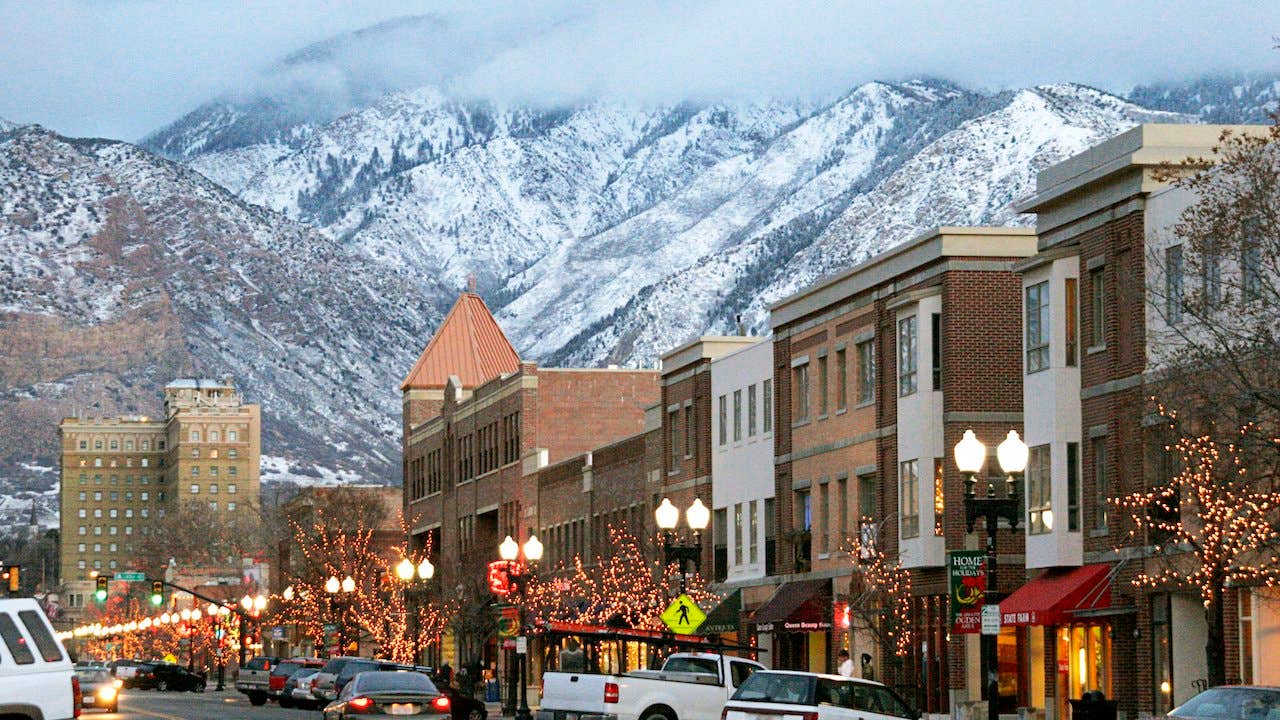Buying a house in Utah: A how-to

If you’ve been thinking about buying a place in Utah, you’ve probably also been thinking about another question: Should you buy a house now or wait? With median sale prices surging to more than $520,000, according to the Utah Association of Realtors, it may feel like a very difficult time to try to become a homeowner here. However, if you’re committed to living in Utah for the long term, it’s still wise to buy now instead of down the road — especially with prices and mortgage rates unlikely to drop dramatically anytime soon.
So, whether you’re looking to live in Salt Lake City or St. George, read on for all the steps you need to take to buy a house in Utah.
How to buy a house in Utah
Decide where to live in Utah
If you’re moving to Utah with no particular destination in mind, it’s important to understand that the state is massive: nearly 85,000 square miles. And while housing prices have been increasing across all of Utah, there is a wide gap among different regions. For example, Summit County — the home of popular skiing-and-Sundance destination Park City — has a high median price tag of $1.35 million, whereas counties like Carbon, Duchesne and Emery boast much more affordable medians below $250,000.
When choosing a Utah home, you’ll also need to think about the cost of buying everything else, like groceries, gasoline, utilities, food and more. And keep in mind that ski-resort towns that attract tourists will almost always be more expensive. Bankrate’s cost of living calculator can be a helpful tool in getting a sense of how far your income can stretch from one location to another. For example, the cost of living in Ogden is around 6 percent lower than it is in Salt Lake City.
Tips for buying a house in Utah
Before you start comparing mortgage rates in Utah, it’s smart to have a good idea of how much money you’ll be looking to borrow. Across nearly the entire state, the 2022 conforming loan limit is $647,200. There are two exceptions: Wasatch and Summit Counties both have limits of $970,800. If you need to borrow more to buy a home, you’ll enter jumbo loan territory, and you’ll need both a higher credit score and a bigger down payment.
Things to know about buying a house in Utah
Utah is a unique state with some unusual laws and a very competitive housing market. Here’s a rundown of some key considerations for homebuyers:
- Property taxes: Property tax rates here are quite low. According to the Tax Foundation, the typical Utah homeowner pays a rate of 0.59 percent of the property’s assessed value — one of the lowest rates in the nation. However, it’s not as simple as it sounds: The Utah State Tax Commission has a 451-page document with rates that vary by school district, water improvement district and a number of other qualifiers. Be sure to ask a seller for past property-tax bills to help estimate what your obligations might be.
- Dual agency: When you find a real estate agent to help you buy a place in Utah, he or she may ask you to complete a form that permits them, or someone who works at their same brokerage firm, to be the seller’s representative as well. It’s called dual agency, and while it is prohibited in some states, Utah is one of the many states that allow it.
- Seller’s disclosure: As in most states, Utah home sellers are required to share knowledge of any defects that might impact property value on a property condition disclosure form. Look over this form carefully to make sure you are aware of, for example, zoning issues or past leaks. And if you have any specific questions, ask them: Sellers must be honest in Utah.
- Closing costs: In 2021, closing costs in Utah averaged $4,837, or 1 percent of the average purchase price, according to data from ClosingCorp. While the seller usually covers the cost of title insurance here, you’ll still have a range of expenses on your plate, including a separate title policy for your lender, an appraisal fee, lender fees and miscellaneous other costs. Be sure to budget for these in addition to your down payment.
- Attorneys: There is no law in Utah mandating that a buyer must hire a real estate attorney. However, it’s a worthwhile expense to add to your budget. Buying a home is an expensive transaction with lengthy contracts and complicated language, so professional legal advice is well worth the cost.
- Climate and weather considerations: You’ll need to pay to protect your home in Utah, just like anywhere else. However, in addition to standard homeowners insurance, think carefully about the additional risks that exist in the state — namely wildfires. Between 800 and 1,000 wildfires occur in the state each year, so you should make sure your policy includes ample protection in the event that a natural disaster damages your property. Mountain towns may be susceptible to avalanches as well.
How much house can I afford in Utah?
As you think about your budget for buying a house in Utah, the first piece of the puzzle to consider should be your income. Financial experts say you should not spend more than 28 percent of your income on your housing costs. For example, if you earn $7,000 each month, your mortgage payment shouldn’t be more than $1,960.
However, home affordability isn’t just about what you’re earning. You also need to think about what you’re spending to pay down other debts, like car payments or student loans. Bankrate’s new-house calculator can help you set a realistic budget based on your earnings, your down payment contribution and your regular debt payments.
Saving for a down payment in Utah
Coming up with a down payment is often the most daunting piece of buying a home — and in Utah, where home prices have been skyrocketing, saving enough for it can feel like climbing one of the state’s massive mountain peaks.
There are, however, programs in place that aim to help first-time homebuyers achieve that goal. Utah Housing, the state’s housing authority, will help first-time homebuyers get a second mortgage to pay for down payment and closing costs. There is a major drawback, though: It has an interest rate that is 2 percent higher than the rate of the buyer’s first mortgage, which also must be secured through Utah Housing. So, in the long run, this could be a very costly loan.
If you’re a low-income homebuyer, you may be able to qualify for more generous assistance in Salt Lake City, Salt Lake County or Taylorsville through the Community Development Corporation of Utah. The good news: These loans are forgivable after a certain period of time. The bad news: They are very hard to secure. It’s also worth looking for nationally available down payment assistance to make buying a home in Utah more affordable.
Get preapproved for a mortgage
Once you have an idea of what your down payment will be, you’ll need to get preapproved for a mortgage. If you aren’t preapproved, you shouldn’t really bother looking for a house. Why? Because a seller may not take you seriously. Luckily, it’s a fairly easy process — if you qualify, some digital-first lenders may be able to offer a preapproval letter in just 15 minutes.
Find the right lender
You don’t actually have to get your mortgage from the same lender that issues you a preapproval. Make sure you compare a range of lenders in Utah to get a sense of where you’ll be able to lock in the best rates, lowest fees and fastest closing.
Find the best local real estate agent in Utah
You could try to buy a house without a Realtor, but it’s not recommended. Utah is a very competitive place to buy, so having an experienced local real estate agent by your side can make a huge difference. When you find a place you love, your agent will help you craft an offer that captures the attention of the seller. Should you make it immediately? Should you include any contingencies? Should you offer more than the listing price? These are all questions you may have, and a local agent will have the answers.
And if you’re one of the many new Utahans moving from another state, a real estate agent is even more crucial. As you interview potential agents, look for the initials CRP, which stands for Certified Relocation Professional — this will tell you whether they have specific training and expertise in helping clients create new nests in the Beehive State.
Start house hunting and make an offer
Now, it’s time for the fun part: You’re ready to actually go look at homes. With a preapproval letter in your pocket and your agent by your side, make a list of open houses you want to attend and listings you want to tour.
Your agent will help you find plenty of places that fit your criteria and budget. And remember that your budget is there for a reason: Don’t try to stretch beyond your means. Unless you’re swimming in cash, buying a home is a game of bargaining with yourself. Can you trade an outdated kitchen for a huge backyard? Will you be OK with room for just one car in the garage? It doesn’t have to be your dream home in its current form; you can always update it over time.
Get a home inspection and appraisal
Once your offer is accepted, you need to do some investigative work to make sure that the property is a good investment for your future. Hire a professional home inspector to take a thorough look through every corner of the home and identify any reasons to be concerned — they will flag any evidence of mold, past plumbing leaks or electrical issues, for example.
If you’re financing the purchase with a mortgage, you’ll also need to schedule an appraisal. While the home inspection covers your interests, the appraisal covers your lender’s: It helps them verify the property’s market value, so that they’re not loaning out more than the home is worth.
Final walk-through and closing on your new Utah home
As you near the finish line, you’ll receive a closing disclosure with an exact breakdown of the money you’re going to need to bring to closing. Compare this number with your initial loan estimate, and ask your agent how you should pay for the expenses. You’ll likely need a certified check or cashier’s check.
However, before you hand over all that cash, make sure you conduct a final walk-through to verify that the home is in the condition you’ve been promised. It’s smart to do this just before your closing. The closing itself mostly involves signing a ton of documents — after your hand feels a bit cramped, though, it’s time to celebrate. The keys are officially yours, and you are a Utah homeowner. Congrats.
FAQs
-
Yes. Buying a house in Utah has been very challenging over the past year due to a supply shortage combined with a surge of new residents flocking to the state. The statewide median sale price has increased by more than 24 percent over the past year to $521,500, according to the Utah Association of Realtors. However, there are promising signals for buyers who have been on the sidelines: The association also reported a 90 percent year-over-year increase in the number of homes for sale in June of 2022.
-
It depends on many factors: where in the state you want to buy a home, how much the home costs, how much you contribute to the down payment, what other debts you have to pay off, the cost of living and more. The statewide median home price hit $521,500 in June of 2022, according to the Utah Association of Realtors. At that price, if you made a 10 percent down payment ($52,150) on a 30-year mortgage with a 5.5 percent interest rate, your monthly mortgage payment for principal and interest would be $2,664. Since most financial experts advise against spending more than 28 percent of your earnings on housing expenses, that means your household would need to make around $9,500 every month, or $114,000 per year. However, that’s just for the median price — half of the home sales in the state cost less than $521,500, and in many areas the prices are considerably lower. For example, the median sale price in Uintah County is $249,900, and in Emery County it’s just $208,550.
Why we ask for feedback Your feedback helps us improve our content and services. It takes less than a minute to complete.
Your responses are anonymous and will only be used for improving our website.






